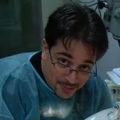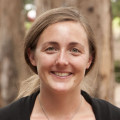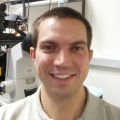iMCB arranges additional teaching sessions, led by postdoctoral fellows, to complement regularly scheduled lectures in graduate courses. If you are interested in serving as one of our Postdoctoral Liaisons (PLs) please contact Kathleen or Adam.
|
Kathleen Pestal After graduating from UCSD in 2006 with a BS in Microbiology, I spent 2 more years at UCSD as a technician studying the immune response to Leptospira and 3 years as a technician at UC Berkeley in the Raulet Lab studying NK cell roles in autoimmunity. I was a grad student at the University of Washington in the Stetson Lab, studying the roles for ADAR1 in negatively regulating cytosolic nucleic-acid sensing and cell biology. As a postdoc in the Barton Lab, my main focus is how different cell types negatively regulate nucleic acid-sensing Toll-like Receptors to prevent aberrant responses to self. I’m passionate about achieving equity in STEM and making MCB an inclusive environment for all. |
Adam Yokom I am a first-generation college student (Oakland University in Michigan) into a PhD (Univ. of Michigan) into a Postdoctoral Fellow here at Berkeley. I joined the Hurley Lab in 2017 to follow my passion for studying dynamic and structurally problematic protein complexes. I study the autophagy initiation complex termed, ULK1. This complex is massive and flexible in all the ways that make structural biology challenging but is an essential complex for life. I love mentoring, teaching and discussing how to navigate awkward academic situations. |
|
Jessica Witchley |
Suifang Mao |
|
Flora Rutaganira |
Tina Sing I have been a postdoc in Dr. Elçin Ünal’s lab since February 2018 and an iMCB postdoc liaison since September 2018. My research project is focused on trying to leverage gametogenesis-specific rejuvenation pathways to counteract cellular aging. I received my PhD from U of Toronto (Canada) where I worked on chromosome segregation in Dr. Grant Brown’s lab and received my BSc from Western University (Canada) where I studied DNA replication in Dr. Megan Davey’s lab. Outside of the lab, I love watching/playing soccer (GGMU!), stouts and hanging out with my cat, Charlie.
|
|
Gabriella Sterne My major research interest is how neural circuits compute feeding decisions. I was introduced to research as an undergraduate at Whitman College, where I worked in the lab of Dr. Ginger Withers studying how cytoskeletal stability impacts the development of polarity in hippocampal neurons. After graduating, I pursued my Ph.D. at the University of Michigan in the laboratory of Dr. Bing Ye. There, I studied how altered expression of a gene implicated in the pathogenesis of Down syndrome. Currently, I am a joint postdoc in the labs of Drs. Kristin Scott and Barry Dickson. I spent the first two years of my postdoc at Janelia Research Campus developing a collection of genetic reagents to individually label specific neurons in the subesophageal zone of Drosophila melanogaster. Now at Berkeley, I am leveraging this collection to study the neural circuits that relay sweet taste to memory centers and that govern feeding decisions.
|
Coral Zhou I am a post-doc in Rebecca Heald’s lab, where I focus on how mitotic chromosomes are shaped and sized during frog embryogenesis. Before venturing into the field of cell biology, I was a graduate student in Geeta Narlikar’s lab at UCSF, where I studied the biochemical and biophysical mechanisms of an ATP-dependent chromatin remodeling machine called INO80. In lab, I love chromatin, but outside of science I also love football, dogs and eating pizza. Fun fact: I have a pet axolotl named Lucy (pictured) who lives in the lab. |
|
I was born and raised in Montevideo, Uruguay. At age 19 I moved to Israel, where I did my B.Sc. and M.Sc. (Neurobiology) at the Hebrew University of Jerusalem and a Ph.D. (Cell&Dev Biol) at Tel Aviv University. In 2014 I moved to UC Berkeley and joined the Kramer lab to investigate the physiological changes to retinal neurons during blindness in mouse models of retinal degeneration. I enjoy teaching and training new scientists, which I consider a rare privilege. I hope to contribute to your intellectual and personal development as the next generation of scientists. |
I am a postdoc with Prof. Iswar Hariharan and study the molecular mechanisms of tissue regeneration. The regrowth of damaged tissues often requires adjacent cells to change their cellular identity. We investigate this process in Drosophila with a combination of powerful genetic tools and single-cell RNA sequencing. Besides lab, I can be found outside searching for birds to add to my life list.
|
|
I grew up in Chicago, IL and went to college at the University of Chicago, where I double-majored in biology and chemistry. After spending a year at the University of Cambridge in the UK, I obtained a PhD in Systems Biology at Harvard University. I developed an in vitro single-molecule assay for studying non-homologous end joining repair of DNA double-strand breaks. I ventured into neural circuits during a short postdoc at The Rockefeller University in NYC, before deciding to return to my molecular biology roots. Currently I am a postdoc in the Tjian-Darzacq lab at UC Berkeley, where I am using fluorescence imaging to study transcription regulation and nuclear organization. |


